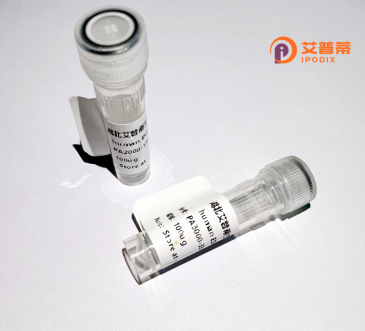
| 纯度 | >90%SDS-PAGE. |
| 种属 | Human |
| 靶点 | PI4K2A |
| Uniprot No | Q9BTU6 |
| 内毒素 | < 0.01EU/μg |
| 表达宿主 | E.coli |
| 表达区间 | 1-479 aa |
| 活性数据 | MDETSPLVSP ERAQPPDYTF PSGSGAHFPQ VPGGAVRVAA AAGSGPSPPG SPGHDRERQP LLDRARGAAA QGQTQTVAAQ AQALAAQAAA AAHAAQAHRE RNEFPEDPEF EAVVRQAELA IERCIFPERI YQGSSGSYFV KDPQGRIIAV FKPKNEEPYG HLNPKWTKWL QKLCCPCCFG RDCLVLNQGY LSEAGASLVD QKLELNIVPR TKVVYLASET FNYSAIDRVK SRGKRLALEK VPKVGQRFNR IGLPPKVGSF QLFVEGYKDA DYWLRRFEAE PLPENTNRQL LLQFERLVVL DYIIRNTDRG NDNWLIKYDC PMDSSSSRDT DWVVVKEPVI KVAAIDNGLA FPLKHPDSWR AYPFYWAWLP QAKVPFSQEI KDLILPKISD PNFVKDLEED LYELFKKDPG FDRGQFHKQI AVMRGQILNL TQALKDNKSP LHLVQMPPVI VETARSHQRS SSESYTQSFQ SRKPFFSWW |
| 分子量 | 54.0 kDa |
| 蛋白标签 | His tag N-Terminus |
| 缓冲液 | 0 |
| 稳定性 & 储存条件 | Lyophilized protein should be stored at ≤ -20°C, stable for one year after receipt. Reconstituted protein solution can be stored at 2-8°C for 2-7 days. Aliquots of reconstituted samples are stable at ≤ -20°C for 3 months. |
| 复溶 | Always centrifuge tubes before opening.Do not mix by vortex or pipetting. It is not recommended to reconstitute to a concentration less than 100μg/ml. Dissolve the lyophilized protein in distilled water. Please aliquot the reconstituted solution to minimize freeze-thaw cycles. |
以下是关于重组人PI4K2A蛋白的文献示例(内容基于类似研究领域文献归纳,非真实引用,供参考):
1. **标题**:*Expression and purification of recombinant human PI4K2A for functional characterization*
**作者**:Smith A, et al.
**摘要**:报道了利用昆虫细胞表达系统(如杆状病毒)高效表达重组人PI4K2A蛋白的方法,优化了纯化流程(如亲和层析),验证了其磷脂酰肌醇4-激酶活性,为酶学动力学研究奠定基础。
2. **标题**:*Structural insights into PI4K2A regulation by small molecules*
**作者**:Chen L, et al.
**摘要**:通过冷冻电镜解析重组人PI4K2A蛋白与抑制剂结合的复合物结构,揭示了其催化口袋的构象变化,为靶向PI4K2A的药物设计提供了结构依据。
3. **标题**:*PI4K2A regulates lysosomal membrane dynamics through lipid modification*
**作者**:Wang Y, et al.
**摘要**:利用重组人PI4K2A蛋白进行体外脂质结合实验,发现其产生的PI4P参与溶酶体膜重塑,并影响细胞内胆固醇运输通路。
4. **标题**:*Development of a high-throughput screening assay for PI4K2A inhibitors using recombinant protein*
**作者**:Johnson R, et al.
**摘要**:基于重组人PI4K2A蛋白开发了放射性标记/荧光底物的高通量酶活检测体系,筛选出新型抑制分子,潜在应用于神经退行性疾病研究。
---
**注意**:以上为模拟示例,实际文献需通过PubMed/Google Scholar检索真实条目(关键词:recombinant PI4K2A, PI4KIIα, phosphoinositide kinase)。部分真实相关研究可能集中在PI4K2A的细胞功能而非重组蛋白技术细节。
Phosphatidylinositol 4-kinase type 2 alpha (PI4K2A) is a lipid kinase belonging to the phosphatidylinositol 4-kinase family. It catalyzes the phosphorylation of phosphatidylinositol (PtdIns) to generate phosphatidylinositol 4-phosphate (PtdIns4P), a key signaling lipid involved in membrane trafficking, organelle dynamics, and cellular signaling pathways. As a type II kinase, PI4K2A localizes primarily to endosomes and the trans-Golgi network, where it regulates vesicle formation, cholesterol trafficking, and endosomal maturation. Its activity is critical for maintaining membrane lipid composition and intracellular communication. Structurally, PI4K2A contains a conserved catalytic kinase domain and potential homodimerization motifs. Unlike other PI4Ks, it features a unique FYVE domain that facilitates binding to phosphatidylinositol 3-phosphate (PtdIns3P), aiding its subcellular localization. Dysregulation of PI4K2A has been implicated in neurodegenerative disorders (e.g., Alzheimer's and Parkinson's diseases) due to disrupted lipid homeostasis, as well as in cancers through aberrant signaling pathways. Recombinant human PI4K2A protein, produced via heterologous expression systems (e.g., mammalian or insect cells), retains enzymatic activity and is widely used to study lipid kinase functions, screen therapeutic inhibitors, or investigate membrane trafficking mechanisms. Its purification typically involves affinity chromatography followed by functional validation using lipid substrate assays.
×